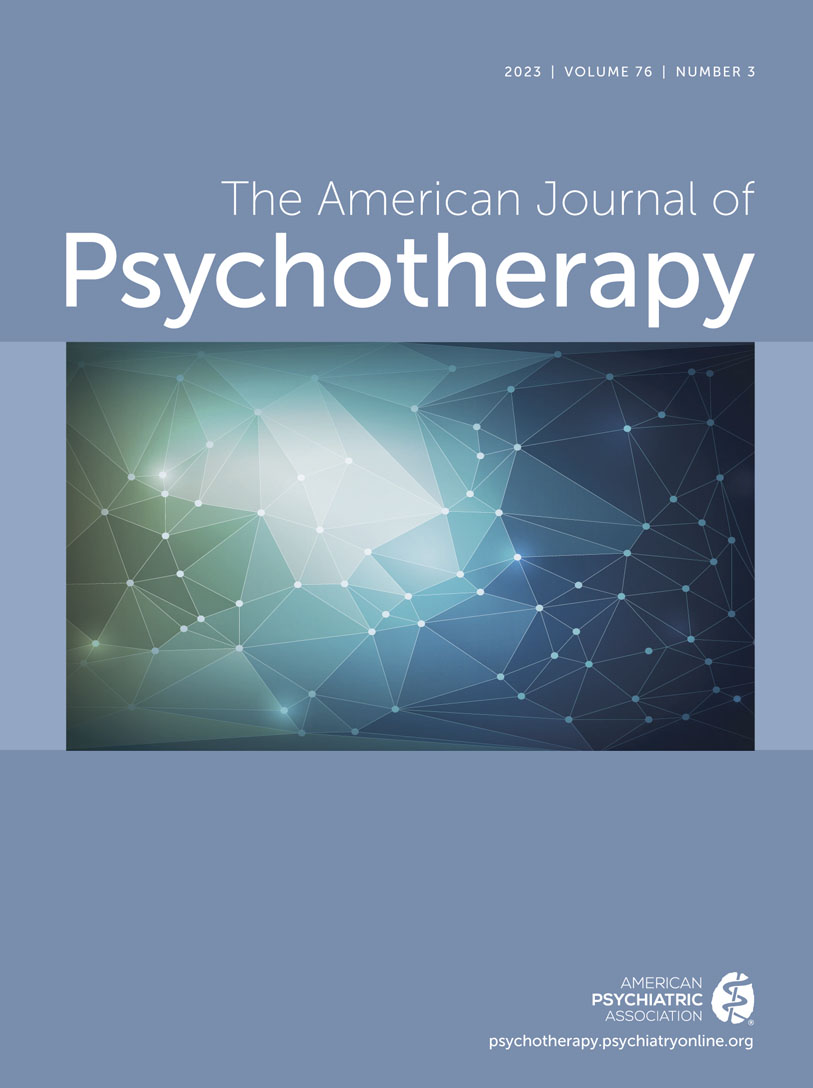American Journal of Psychotherapy
- Volume 56
- Number 4
- October 2002
Articles
Publication date: 01 October 2002
Pages455–479Clinical study of envy and jealousy in the psychotherapy situation indicates that these two states of mind are biopsychosocial response patterns involving the perceptual, cognitive, affective, and intentional mental functions. These response patterns are ...
https://doi.org/10.1176/appi.psychotherapy.2002.56.4.455Publication date: 01 October 2002
Pages480–493Sexual boundary violations remain a persistent problem in psychiatry despite increased attention, disciplinary activity, and educational efforts. Currently, therapists in training are often overwhelmed by a sense of danger in every direction, including ...
https://doi.org/10.1176/appi.psychotherapy.2002.56.4.480Publication date: 01 October 2002
Pages494–507Professionals engaged in trust relationships can become the target of false allegations in courts and ethics committees. An allegation is considered false when it is not possible to establish a direct and clear causal link between actions (or inactions) ...
https://doi.org/10.1176/appi.psychotherapy.2002.56.4.494Publication date: 01 October 2002
Pages508–521The Haitian community in the United States is growing steadily. They make up a significant portion of many cities. As a group, Haitian immigrants are challenge to mental health professionals. Their view and concepts of the world are unique. Non-Haitian ...
https://doi.org/10.1176/appi.psychotherapy.2002.56.4.508Publication date: 01 October 2002
Pages522–538Recommendations for psychotherapeutic management of patients with narcissistic personality disorder are based on clinical experience; however, little attention has been given to the role of couple therapy with these patients. A stable intimate ...
https://doi.org/10.1176/appi.psychotherapy.2002.56.4.522Publication date: 01 October 2002
Pages539–554We analyzed whether defense mechanisms changed and/or predicted outcome during brief dynamic psychotherapy (N=43, max 40 sessions, Norwegian Multisite Study on Process and Outcome of Psychotherapy). Defenses were rated with the Defense Mechanism Rating ...
https://doi.org/10.1176/appi.psychotherapy.2002.56.4.539Publication date: 01 October 2002
Pages568–584Although the practice of family therapy in dialectical behavior therapy (DBT) with multiproblem suicidal adolescents is common and generally indicated, particular model has yet to be delineated with this age group. The purpose of this article is to ...
https://doi.org/10.1176/appi.psychotherapy.2002.56.4.568Publication date: 01 October 2002
Pages585–602Dialectical Behavior Therapy (DBT) is based on a transactional model of the etiology of borderline personality disorder (BPD). It assumes that the associated emotional dysregulation is not simply biological or family induced but the result of a dynamic ...
https://doi.org/10.1176/appi.psychotherapy.2002.56.4.585Case Report
Publication date: 01 October 2002
Pages555–561This case study discusses the treatment of a 67-year-old man with no prior history of psychiatric illness diagnosed with major depression following cardiac transplantation. Shortly after surgery, the patient demonstrated depressive symptoms, including ...
https://doi.org/10.1176/appi.psychotherapy.2002.56.4.555Publication date: 01 October 2002
Pages562–567The incidence of posttraumatic stress disorder (PTSD) after heart transplant is about 17%, making it an important psychosocial complication. This case study discusses the relationship between early traumatizing experiences loss and the lead symptoms of ...
https://doi.org/10.1176/appi.psychotherapy.2002.56.4.562Abstracts
Publication date: 01 October 2002
Pages603–606https://doi.org/10.1176/appi.psychotherapy.2002.56.4.603Index
Publication date: 01 October 2002
Pages607–610https://doi.org/10.1176/appi.psychotherapy.2002.56.4.607Past Issues
View Issues Archive
Vol. 77 | No. 2

Vol. 77 | No. 1

Vol. 76 | No. 4
